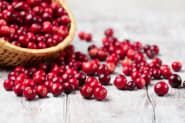If I were to ask you what connection exists between the end of a famous song, a president, a general, a bouncing ball and a well-known British-American journalist, what would you answer? Interestingly, the answer comes by way of a superfood known as cranberries.
In the fadeout to the song, “Strawberry Fields Forever,” John Lennon pronounces the words, “cranberry sauce.”
In “the Great Cranberry Scare of 1959,” certain events unfolded affecting the cranberry crop that year. It was common for farmers to use the herbicide, aminotriazole, to help in harvesting the cranberries. As it was always used in early November, there was adequate time for the herbicide to rub off by Thanksgiving. However, that year, right before Thanksgiving, it leaked out that a barrel harvested in the Pacific Northwest tested positive for the herbicide. That year President Eisenhower didn’t eat cranberries on Thanksgiving.
Cranberry sauce didn’t take hold immediately in the New World. There was a progression. The first person to popularize it was General Ulysses S. Grant who served it to his soldiers in the Civil War.
One way of harvesting cranberries is through flushing them out of bogs, which are the wetlands in which they grow. Once pressure is put on the cranberries, they separate from the vine and flow to the surface because of air bubbles that are contained within. Because of these air pockets a cranberry can bounce like a ball.
A famous British-American journalist, Alistair Cooke, was known for a famous quote, “It has been an unchallengeable American doctrine that cranberry sauce, a pink goo with overtones of sugared tomatoes, is a delectable necessity of the Thanksgiving board and that turkey is inedible without it.” This was an important statement because it indelibly tied Thanksgiving to cranberry sauce in the modern era.
Were Cranberries Present at the First Thanksgiving Meal?
There are a few things we know for sure that occurred before Thanksgiving 1621. By that time Pilgrims arrived in America, a land already inhabited by Native Americans. We know that Native Americans already made use of cranberries for medicinal, dying, ingesting and preservative purposes. However, on that actual Thanksgiving Day, we do not know if the Native Americans brought cranberries to the meal. One could certainly speculate and say that it would be logical that they would bring this fruit with them to a meal as they did consume it, but we have no proof of it.
The Native Americans, depending on their tribe, called cranberries either sassamenesc or ibimi. The new settlers called it cranberries because the cranberry blossom looked like the head of a crane, a certain type of bird. They also called them fenberries and bearberries.
We find a mention of cranberry sauce connected to turkey in the believed to be first American cookbook that was released in 1796, titled American Cookery that was authored by Amelia Simmons. There she offers a recipe for combining roast turkey and cranberry sauce.
The method of harvesting cranberries has evolved. In the beginning, it was done more manually, either by picking or eventually by dry harvesting them with more advanced equipment. Today, the preferred method is to flood the bogs – wetlands where they grow – and collect them at the surface and pack them in trucks. These cranberries are mostly used to make cranberry sauce. The leftover cranberries that are not collected from the bogs are bagged and sold as raw cranberries.
Today, Americans consume more than 400 million pounds of cranberries a year and 20 percent of that on Thanksgiving in a 300 million-dollar industry. Though Massachusetts is second to Wisconsin in the number of cranberries harvested, it relies more heavily on the cranberry output.
The Health Benefits of Cranberries
Cranberries are a superfood seeped in antioxidants and nutrients. They offer benefits in terms of weight loss, offsetting urinary tract infections (UTIs), potentially preventing and slowing down some cancers and bolstering heart well-being.
In terms of weight loss, cranberries have very few calories. Jennifer Sygo, a registered dietician notes, “Cranberries [are] among the lowest calories of any fruit that’s out there.” She therefore believes it’s the perfect fruit to consume as it has so few calories and so many nutrients. From a culinary stance, she recommends using it for toppings.
A study in the American Journal of Obstetrics and Gynecology concluded that cranberries help prevent UTIs. This is because cranberries contain proanthocyanidins (PACs) which assist to halt unhealthy bacteria from sticking to the walls of the urinary tract.
There have been links between cranberries and cancer prevention. Dr. Manoj K. Ahuja, from Sukdha Hospital in New Delhi, India says, “Research has shown that cranberries are beneficial in slowing tumor progression and have shown positive effects against prostate, liver, breast, ovarian and colon cancers.” In an article titled, “Cranberries and Cancer: An Update of Preclinical Studies Evaluating the Cancer Inhibitory Potential of Cranberry and Cranberry Derived Constituents,” Katherine M. Weh, Jennifer Clarke, and Laura A. Kresty found that when cranberry properties were exposed to cancer cells in test tubes, there was either a death or slower growth of these cells.
Cranberries have been found to be beneficial to cardiovascular health. Studies have shown that cranberry properties can help manage cholesterol. In addition, cranberries have been seen to have the effects of increasing blood circulation and reducing blood pressure.
Cranberry-Based Products
Gefen, a popular brand, is OU kosher-certified and has many products in the cranberry arena. If you’re focused on Thanksgiving, they offer Whole Cranberry Sauce.
Kedem, an OU kosher certified company, sells Cranberry Juice, a great medium by which to attain all the healthy properties of cranberries.
For snacking, Van’s Natural Foods, an OU kosher certified company, offers Cranberry Almond Chewy Baked Whole Grain Snack Bars.
Click on the link below for a Cranberry Sauce recipe by McCormick.
https://www.mccormick.com/recipes/sauces/homemade-cranberry-sauce







